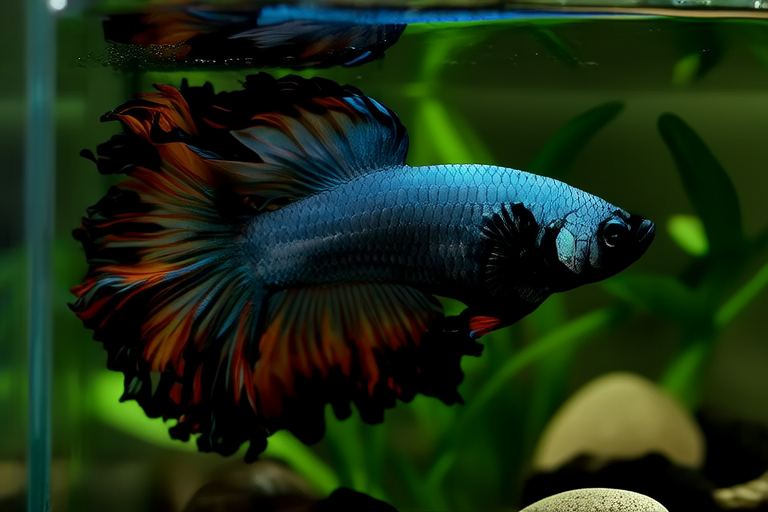Top 10 Mistakes New Betta Owners Make and How to Avoid Them
Welcome to the fascinating world of betta fish! These vibrant, colorful creatures are popular among aquarium enthusiasts due to their striking appearance and relatively low maintenance requirements. However, as with any pet, there are certain pitfalls that new owners might fall into if they’re not fully informed. This article will guide you through the top ten mistakes new betta owners make and provide actionable advice on how to avoid them.
1. Keeping Betta Fish in Insufficiently Sized Tanks
One of the most common mistakes is housing bettas in tanks that are too small. Many beginners believe that because bettas are often sold in tiny containers, they can thrive in similarly sized tanks. This misconception can lead to stress and poor health for your fish. A general rule is to have at least 5 gallons of water per betta, allowing ample space for swimming and reducing ammonia levels.
Actionable Tip: Invest in a larger tank from the start or consider upgrading your current setup. Ensure the tank has adequate filtration and regular water changes to maintain optimal water quality.
2. Neglecting Proper Tank Setup
Setting up a tank correctly is crucial for your betta’s well-being. New owners sometimes overlook the necessity of substrate, plants, and hiding spots which contribute to a natural environment.
Actionable Tip: Use fine gravel or sand as substrate, add live or silk plants, and include caves or ceramic pots for hiding. These elements help reduce stress and promote healthy behaviors.
3. Ignoring Water Conditions
Bettas require specific water parameters to thrive. Maintaining the right pH level (6.5-7.5), temperature (78-82°F), and hardness is vital. Beginners often neglect testing kits and fail to monitor these factors regularly.
Actionable Tip: Purchase a reliable water test kit and check parameters weekly. Use a heater to keep temperatures stable and install a filter to manage waste and toxins.
4. Feeding Inappropriate Diets
Many new owners overfeed their bettas or provide unsuitable foods like human food scraps. Bettas need a balanced diet rich in proteins and fats.
Actionable Tip: Feed high-quality betta pellets twice daily, supplemented with occasional treats such as bloodworms or brine shrimp. Limit feeding to what your betta can consume within two minutes.
5. Overlooking Betta Behavior and Needs
Understanding betta behavior is essential for their care. Some owners mistake natural territorial displays for aggression, leading to unnecessary stress.
Actionable Tip: Learn about betta behavior to differentiate between normal activity and signs of distress. Provide toys and floating objects to stimulate exploration and play.
6. Choosing Incompatible Tank Mates
While it’s tempting to create a community tank, many new owners introduce species that are incompatible with bettas.
Actionable Tip: Avoid aggressive or fin-nipping fish. Opt for peaceful companions like ghost shrimp or snails. Always research potential tank mates thoroughly before adding them.
7. Handling Your Betta Improperly
Improper handling can harm your betta. Many owners attempt to catch their fish without proper tools or techniques.
Actionable Tip: Use a soft net designed for fish and handle your betta gently. Never pour water from one container to another to transfer your fish.
8. Not Providing Adequate Lighting
Proper lighting not only enhances the beauty of your tank but also supports plant growth. Some owners forget to adjust lighting schedules, disrupting circadian rhythms.
Actionable Tip: Install LED lights and set a timer for 8-12 hours of light per day. Ensure there’s an off period for darkness.
9. Failing to Clean the Tank Regularly
Regular cleaning is essential for maintaining a healthy environment. Neglecting this can lead to poor water quality and disease.
Actionable Tip: Perform partial water changes weekly, cleaning decorations and filters as needed. Remove uneaten food promptly to prevent decay.
10. Not Seeking Professional Advice When Needed
Even experienced owners face challenges. Sometimes, consulting a veterinarian or experienced aquarist can provide insights into specific issues.
Actionable Tip: Join local or online forums, attend workshops, and consult professionals when faced with persistent problems. They can offer personalized advice tailored to your situation.
In conclusion, while caring for betta fish can be rewarding, it requires attention to detail and continuous learning. By avoiding these common pitfalls and following the provided tips, you’ll ensure a happy, healthy life for your betta. Remember, understanding and meeting your fish’s needs is key to their longevity and well-being.
